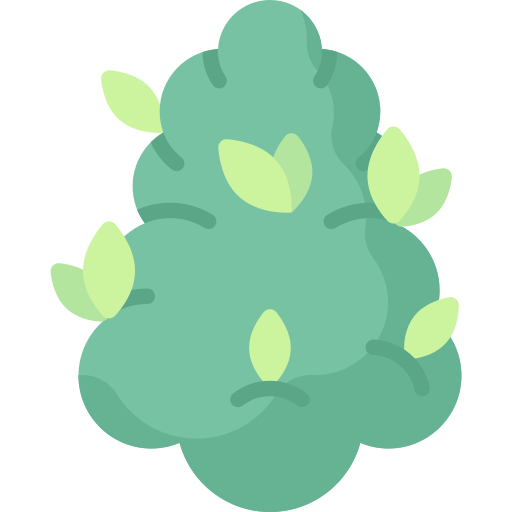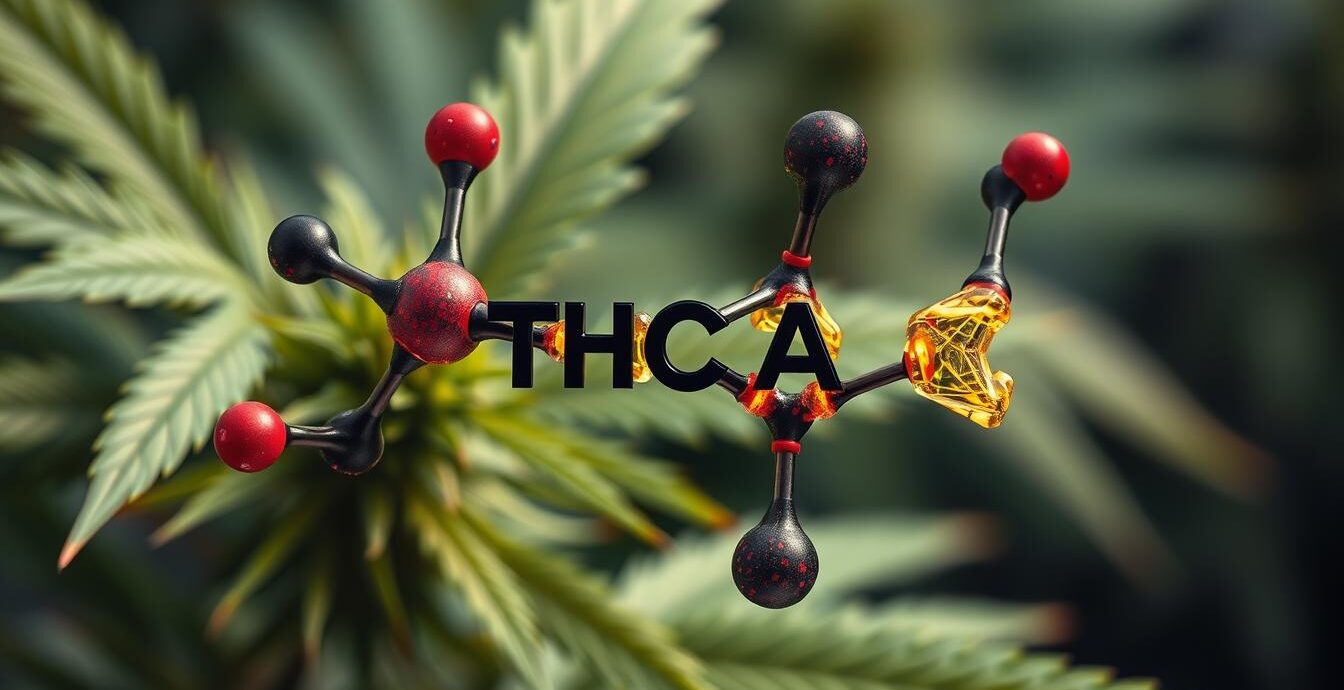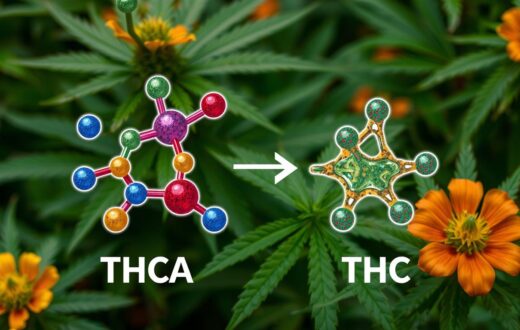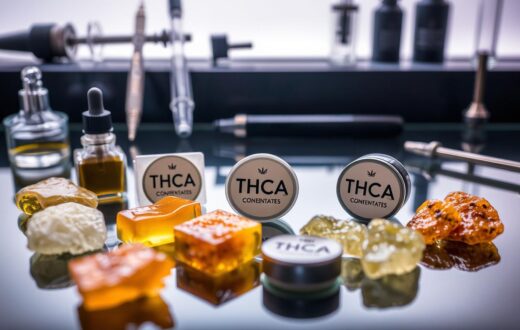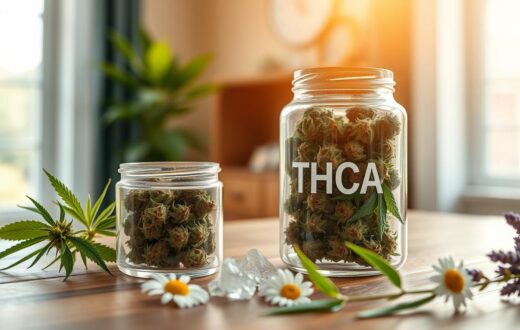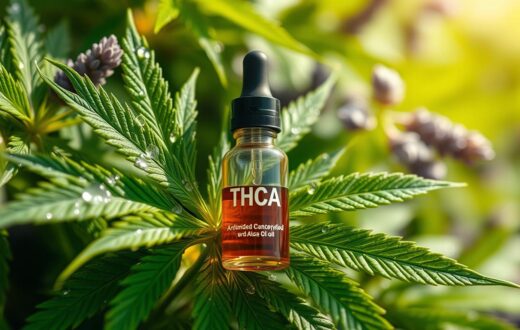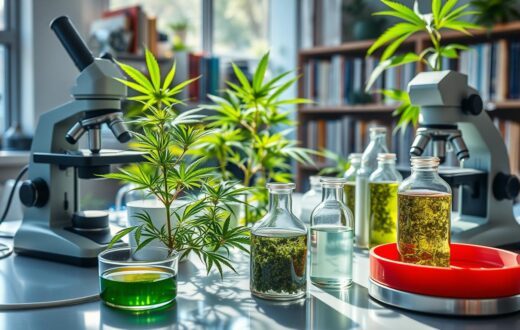Have you ever thought about the hidden benefits of cannabis? THCA, or tetrahydrocannabinolic acid, is a non-psychoactive compound that’s getting a lot of attention. It’s a cannabinoid precursor that could lead to new treatments without the usual marijuana high.
THCA is found in raw cannabis plants and might offer many health benefits. It could help with inflammation and pain, changing how we see cannabis’s medical uses.
Studies suggest THCA could help with pain, nausea, and even protect nerves. This is interesting because THCA doesn’t make you feel high like regular cannabis. This makes it appealing for those looking for cannabis’s health benefits without the psychoactive effects.
As we learn more about THCA, we’ll look at its connection to THC, its legal status, and the latest research. This journey into THCA’s world is exciting for anyone interested in cannabis science. It could change how we view natural medicine.
What is THCA?
THCA is a cannabinoid found in raw cannabis plants. It’s a non-psychoactive compound, rich in fresh leaves and flowers. THCA is unique among the 500+ known cannabinoids. Unlike THC, it doesn’t cause a “high” when consumed.
Understanding the Basics of THCA
THCA is the precursor to THC, the psychoactive compound in cannabis. It’s found in high amounts in fresh plants. When cannabis is heated, like during smoking or cooking, THCA turns into THC.
The legal status of THCA is different from THC. The 2018 Farm Bill makes THCA legal if it has less than 0.3% THC.
Differences Between THCA and THC
THCA and THC have different effects on the body. THCA is non-psychoactive, meaning it doesn’t cause a “high”. THC, however, is known for its mind-altering effects.
THCA shows promise in several areas. It may have anti-inflammatory, neuroprotective, and antiemetic properties. These potential benefits make THCA an interesting subject for medical research.
THCA is available in various forms. You can find it in raw cannabis, edibles, tinctures, and topicals. THC is more commonly found in vapes, dried flower, and concentrates. The choice between THCA and THC products depends on the desired effects and legal considerations.
The Science Behind THCA
THCA is a non-psychoactive cannabinoid found in raw cannabis. It has unique properties that interest researchers. This compound works differently than THC, its well-known cousin. Let’s explore the science behind THCA and its health benefits.
How THCA Interacts with the Endocannabinoid System
The endocannabinoid system is key to our body’s balance. THCA interacts with it in a special way. Unlike THC, THCA doesn’t directly bind to cannabinoid receptors. It might affect the system indirectly, offering benefits without the high.
The Role of Cannabinoids in Human Health
Cannabinoids like THCA are promising for health. Research shows THCA could fight inflammation, helping with arthritis. It might also protect the brain and help with pain and nausea.
Early studies suggest THCA could improve cell health and prevent diseases. As we learn more about the endocannabinoid system, we find new ways cannabinoids help us. The study of THCA is exciting, with many potential health benefits still to be discovered.
Potential Therapeutic Benefits of THCA
THCA is a non-psychoactive compound found in raw cannabis. It shows promise in various therapeutic areas. This cannabinoid offers unique benefits, different from THC. Let’s look at some of the health advantages of THCA.
Anti-Inflammatory Properties
Research suggests THCA may have strong anti-inflammatory effects. This could help people with arthritis or inflammatory bowel disease. By reducing inflammation, THCA might ease discomfort and improve well-being for those with chronic conditions.
Neuroprotective Effects
THCA has exciting potential in protecting brain cells. A 2017 study found it has strong neuroprotective activity. This suggests it might help manage neurodegenerative diseases like Parkinson’s or Alzheimer’s. The neuroprotective qualities of THCA open new avenues for brain health research.
Pain Relief Mechanism
THCA may offer a natural way to manage pain. Unlike THC, THCA doesn’t produce psychoactive effects. This makes it appealing for those seeking pain relief without the high. Some users report feeling more relaxed and experiencing less discomfort with THCA-rich products. This pain relief mechanism could be especially beneficial for those with chronic pain.
While these findings are promising, more research is needed. Studies on THCA are still in their early stages. As interest in THCA grows, we can expect more research into its benefits for various health conditions.
THCA and Cancer Research
Cancer research has shown promising results for THCA, a compound found in raw cannabis. Scientists are exploring its potential in cancer treatment support and its anti-proliferative effects on cancer cells.
Preliminary Findings on THCA and Cancer Cells
Lab studies reveal THCA’s ability to slow cancer cell growth. In 2017, researchers found it decreased glioblastoma cell growth rates. THCA also showed signs of triggering cell death in breast cancer cultures. These findings spark hope for new cancer treatments.
Potential for Supporting Cancer Treatments
THCA might help cancer patients beyond fighting tumors. It could ease treatment side effects like nausea and poor appetite. A survey at a major cancer center found patients use cannabis for sleep, stress, and pain relief. While the FDA hasn’t approved cannabis for medical use, these early results are encouraging.
Scientists face hurdles in THCA cancer research. Limited funding and unclear dosing guidelines slow progress. Drug interactions are another concern. Still, THCA’s potential in cancer care drives ongoing studies. As research grows, we may see THCA play a bigger role in cancer treatment support.
How to Consume THCA
THCA flower and raw cannabis have special ways to enjoy their benefits. Unlike THC, THCA doesn’t make you high. It’s a great choice for many. Let’s look at how to add THCA to your daily life.
Raw Cannabis vs. Processed Products
Raw cannabis is full of THCA. You can put fresh leaves in salads or smoothies. Juicing raw cannabis is also popular to get THCA without heat.
For those who like processed options, THCA tinctures and capsules offer exact amounts. They’re easy to use.
Popular THCA-Rich Strains
THCA flower is great for smoking or vaping. But, heat changes THCA to THC. Strains like Blue Dream, OG Kush, and Sour Diesel have lots of THCA before heat changes it.
Topical products like creams and balms work on specific areas. They don’t go into your blood. They’re perfect for targeted relief. But, remember, laws about THCA products vary. Always check local laws before buying or using.
Legal Status of THCA in the United States
THCA’s legal status in the US is complex. The 2018 Farm Bill allows hemp products with less than 0.3% THC by dry weight. This creates a legal gray area for THCA. Many states permit THCA flower if it meets the THC threshold. Yet, federal regulations and state laws differ on THCA’s status.
Federal vs. State Regulations
Federal regulations view THCA as equivalent to THC when heated. This interpretation impacts hemp growers and the cannabis industry. State laws vary widely. Pennsylvania allows THCA flower sales but limits processing. Texas has stricter rules on THCA products. California and Colorado take a more open approach to THCA sales.
Impact on Medical and Recreational Use
The legal landscape affects both medical and recreational THCA use. Consumers seek high-THCA strains like Gorilla Glue #4 and Sour Diesel. Raw consumption methods, such as juicing, are growing in popularity. Top brands offer THCA products while trying to comply with shifting regulations. This legal uncertainty poses challenges for users and producers alike.
As debates continue, the future of THCA regulation remains uncertain. Lawmakers and industry stakeholders are working to address these complex issues. The evolving legal status of THCA will shape its availability and use across the country.
Safety and Side Effects of THCA
THCA, found in raw cannabis, is mostly safe. But, knowing the side effects and safety steps is key. Even though it doesn’t affect brain receptors much, it can still impact your body.
Known Risks Related to THCA Consumption
Side effects of THCA include feeling drowsy, dry mouth, and changes in appetite. Some might see blood pressure changes. Long-term use could affect memory and focus.
Smoking THCA can lead to breathing problems due to harmful toxins. About 30% of marijuana users might face some addiction issues.
Precautions for New Users
New users should start with small doses to see how they react. Those with health issues or teens might have different reactions to THCA. It’s important to know about drug interactions.
THCA products must have less than 0.3% Delta 9 THC to be legal. Always talk to a doctor before using THCA, especially if you’re on medication or have health concerns.
THCA vs. CBD: Similarities and Differences
THCA and CBD are two unique cannabinoids in the CBD comparison world. Both are non-psychoactive naturally, but they have different effects and legal statuses. THCA, found in raw cannabis, turns into psychoactive THC when heated. CBD, however, stays non-psychoactive no matter the condition.
Comparing the Benefits of THCA and CBD
THCA has anti-inflammatory, neuroprotective, and antiemetic benefits. It helps with appetite and nausea relief. CBD, on the other hand, has anxiolytic, anticonvulsant, and analgesic properties. It’s known for anxiety relief, reducing seizures, and aiding sleep.
Both interact with the endocannabinoid system but in different ways. THCA’s interaction is indirect, while CBD directly binds with CB1 and CB2 receptors.
Synergy of THC and THCA in Treatment
The concept of cannabinoid synergy is key to understanding cannabis therapy. This synergy, known as the entourage effect, shows that cannabinoids work better together. For example, THC and THCA together may improve pain relief and reduce inflammation.
While CBD is popular for its health benefits, THCA is still being researched. The choice between THCA and CBD depends on personal needs and desired outcomes. Always consult a healthcare professional and choose reputable brands for quality assurance when using these cannabinoids.
The Future of THCA Research
Research on THCA is growing fast in the field of cannabinoid therapies. This is changing the medical research world quickly. In 2023, THCA sales hit 7.3% of the $2.8 billion hemp-derived cannabinoid market, reaching about $200 million in value.
Emerging Studies and Clinical Trials
Scientists are running clinical trials to see how THCA affects health. They’re looking at its anti-inflammatory and neuroprotective effects. They also think it might help with pain, chronic inflammation, brain health, and nausea.
The Potential for Medical Advancements
THCA’s non-psychoactive nature makes it great for medical studies. It’s being studied for its anti-proliferative effects, which could lead to new cancer treatments. Companies like CBD American Shaman are making THCA products like tinctures, topicals, and raw hemp flower. This is expanding the options for cannabinoid therapies.
The future of THCA in medicine looks bright. As research goes on, we might see new treatments for diseases like neurodegenerative ones and chronic pain. While more studies are needed, the growing interest in THCA shows a shift towards exploring different cannabinoid therapies in medical research.
User Experiences and Anecdotal Evidence
THCA users often share their stories, giving us a peek into this non-psychoactive cannabinoid. They talk about how it helps with different health issues. Let’s dive into some user testimonials and community experiences with THCA.
Testimonials from THCA Users
Many users say THCA helps with pain. One person said, “THCA has changed my life with chronic back pain. I get relief without feeling high.” Another user mentioned better sleep, saying, “THCA helps me relax and sleep faster without morning grogginess.”
Community Insights and Shared Benefits
Online forums and social media groups are full of stories about THCA. Users talk about less inflammation and better control over autoimmune disorders. A common point is how much they like THCA’s non-psychoactive effect. One user said, “I can use THCA during the day and still stay focused at work.”
While these stories are hopeful, we should be careful with them. Everyone’s body reacts differently to cannabinoids. What works for one might not work for another. Always talk to a healthcare professional before adding THCA to your routine.
How to Incorporate THCA into Your Routine
Adding THCA to your health routine can be a game-changer. This non-psychoactive compound found in raw cannabis offers many benefits without the high. Let’s explore some easy ways to make THCA part of your daily life.
Tips for Adding THCA to Your Diet
Incorporating THCA into your diet is simpler than you might think. Start by adding raw cannabis leaves to your smoothies or salads. Just a few leaves can boost your THCA intake. You can also try juicing cannabis leaves with fruits and veggies for a nutrient-packed drink. Remember to start small and increase slowly to find what works for you.
Recipes Featuring Raw Cannabis
Raw cannabis recipes are a tasty way to enjoy THCA. Try a green smoothie with spinach, banana, and a few cannabis leaves. Or make a cannabis pesto by blending raw leaves with basil, olive oil, and nuts. These raw cannabis recipes not only taste great but also fit seamlessly into a THCA diet. As you explore these options, you’ll find it easier to make THCA a regular part of your health routine.
Remember, while THCA offers potential benefits, it’s wise to talk to a healthcare pro before making big changes to your diet. They can help you safely integrate THCA into your health routine and ensure it complements your overall wellness goals.
Resources for Further Information on THCA
As interest in cannabis research grows, many people seek reliable information about THCA. We’ve gathered a list of trusted resources to help you dive deeper into this fascinating subject.
Trusted Websites and Publications
For top-notch scientific publications on THCA, check out peer-reviewed journals like the Journal of Cannabis Research. These sources offer in-depth studies and the latest findings. University research centers often share accessible information on their websites, breaking down complex cannabis research for the public.
Professional Organizations Focused on Cannabinoids
Several cannabinoid organizations provide valuable resources. The International Cannabinoid Research Society (ICRS) is a great starting point. They host conferences and share cutting-edge research. The American Chemical Society’s Cannabis Chemistry Subdivision is another excellent source for scientific insights on THCA and other cannabinoids.
Remember to look for up-to-date, evidence-based information when exploring these resources. By staying informed through reputable sources, you’ll gain a deeper understanding of THCA and its potential benefits.
Conclusion: The Future of THCA Benefits
As we conclude our look at THCA, it’s clear this non-psychoactive cannabinoid has a lot to offer. With over 100 cannabinoids in cannabis plants, THCA is special. It has unique properties and promising uses in medicine.
Summary of Key Points
THCA is found in fresh cannabis plants and offers many benefits without causing a high. It has anti-inflammatory and neuroprotective qualities. This makes it a focus for future research.
Unlike THC, THCA doesn’t affect brain receptors. This makes it more accepted in many places. The future of THCA looks bright as scientists learn more about it.
THCA could help with arthritis and brain health, among other things. As research grows, we might see new treatments using THCA. This could change how we treat some health issues.
But, we need more research to fully understand THCA. As the cannabis industry grows, we’ll see more THCA products and studies. This will lead to new treatments and wellness options. The journey of THCA is just starting, and its potential is vast.









